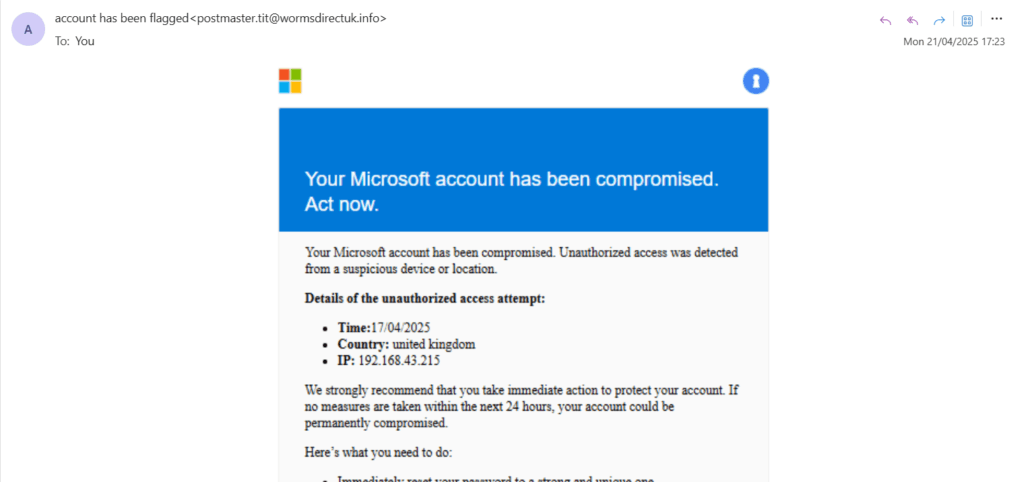If you’ve recently received an alarming email claiming your Microsoft account has been compromised, don’t panic — it’s a scam. Even more frustrating? It’s not your typical phishing attempt aiming to steal your login — it’s likely part of a shady affiliate marketing scheme designed to profit off your fear. This scam is being emailed by numerous email addresses although one known one is [email protected]
Let’s break down what’s really going on.
📧 The Scam Email: What It Looks Like

Your Microsoft Account has been compromised.
Act now.
Your Microsoft account has been compromised. Unauthorized access was detected from a suspicious device or location.
Details of the unauthorized attempt:
• Time 17/04/2025
• Country: united kingdom
• IP: 192.168.43.215
We strongly recommend that you take immediate action to protect your account. If
no measures are taken within the next 24 hours, your account could be permanently compromised.
Here’s what you need to do:
• Immediately reset your password to a strong and unique one.
• Enable two-factor authentication (2FA) for an added layer of security.
• Review recent account activity to identify any suspicious behaviour.
• Ensure that your recovery email and phone number are upto date.
Failure to act could lead to further unauthorized access, data breaches, or loss of sensitive information.
Protect My Account
If you didn’t try and log in or notice unusual activity, we urge you to protect your account now to prevent further risks.
The Microsoft Security Team
Contact Support: If you need assistance, contact our support team at
[email protected] or visit our support page
It looks legit at first glance. There’s urgency. There’s an IP address. There’s even an official-sounding sender line like “[email protected].” But the moment you click the “Protect My Account” button, you’re not taken to Microsoft at all.
Instead, you’re redirected to a TotalAV antivirus deal page — likely with a hidden affiliate tracking link.
🕵️♂️ What’s Really Happening?
This is a hybrid scam — part phishing imitation, part affiliate hustle.
- Scare Tactic:
The scam relies on urgency and fear, pushing you to act without thinking. A 24-hour window, an unfamiliar IP, and the threat of account loss? That’s classic phishing psychology. - Fake Microsoft Alert:
These scammers use official branding, spoofed support addresses, and vague location data to seem authentic.
(By the way,192.168.43.215is a private IP address — not trackable on the public internet. Huge red flag.) - Affiliate Link Redirection:
You click “Protect My Account” expecting to fix your Microsoft security settings…
But instead, you land on a TotalAV antivirus promo page. This is an affiliate landing page where the scammer earns a commission if you download or buy the software.
🧠 Why This Tactic Works (And Why It’s Dirty)
Affiliate marketing itself isn’t bad — in fact, it’s how many legit websites earn money. But when someone uses fear, deception, and brand impersonation to drive traffic to affiliate offers, that crosses a line.
- 🔒 You think you’re protecting your data
- 💳 They’re just trying to make a sale
- 💣 You may even end up with unwanted software or a dodgy trial install
These tactics are against most affiliate program terms (including antivirus providers like TotalAV), but enforcement is hit-or-miss.
✅ How to Protect Yourself
If you see an email like this:
- Don’t click any links.
- Never trust messages that create pressure or panic.
- Check the sender’s email address and where the link actually goes (hover to preview).
- Report phishing attempts to [email protected].
- If you’re worried about your account, go directly to https://account.microsoft.com.
🧼 Final Thoughts
This isn’t just a sketchy email — it’s part of a broader trend of “phishing-style affiliate scams” that are blending digital marketing with deception. It’s important to stay sharp, read between the lines, and always double-check before clicking.
Have you come across something like this? Share your experience in the comments — let’s spread awareness and keep each other safe online. 🛡️
